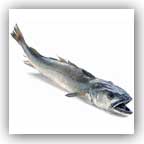|
D“As much as 92 per cent of marine whitefish
by-product is not utilised”, says Anders Bjørnerem,
R&D Director at Nordic Wildfish in Norway. “Commonly
it is only the fillets that are processed to become
food. This is not sustainable food production. As we
approach 2050, the demand for food on this planet
will increase by as much as 70 per cent due to high
levels of population growth. The industry must make
it its goal to utilise the entire fish”, says Ana
Karina Carvajal, Research Manager at SINTEF
Fisheries and Aquaculture.

World-wide, overfishing
is one of the biggest threats to the health of seas
and their inhabitants.
Overfishing also affects many people directly –
above all in developing countries. Daily, tonnes of
fish are hauled out of the sea.
Unfortunately this is
much more than can be naturally replenished – a real
plundering of the world’s oceans.
The fishing company
Nordic Wildfish has been assisting in the
development of a new technology that can make use of
the entire by-product from whitefish such as cod,
pollock and haddock.
Instead of discarding
the heads, guts and the rest of the fish, they can
all be incorporated into a hydrolysis process that
separates the bones, leaving a kind of “soup” to
which enzymes can be added and valuable oils and
proteins extracted.
“The entire process
takes place on board the trawler, which has only
been at sea for two months”, says Anders Bjørnerem,
R&D Director at Nordic Wildfish in Norway.
Tonnes of whitefish
by-product are discarded annually. SINTEF believes
that this material has major commercial potential if
it can be processed to produce high quality
end-products such as ingredients in animal feed and
food for human consumption.
On board the trawler
Molnes, whitefish by-product is processed using
enzymatic hydrolysis to produce valuable proteins,
amino acids and fish oils. Many technologies have
been developed and adapted for installation on board
the refurbished trawler.
“Excellent teamwork
between researchers and the industry will enable
many new systems for better exploitation of the fish
to be implemented within the next two to four
years”, says Carvajal. “We’re very pleased to see
that some segments within the industry have already
taken the first steps towards more sustainable food
production”, Carvajal says.
For more information
SINTEF
Link...
MDN |